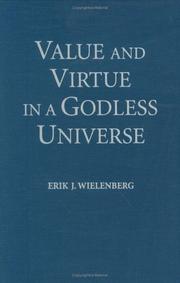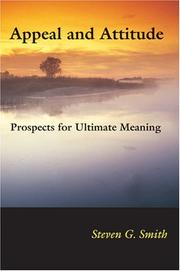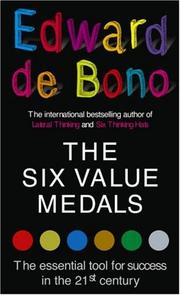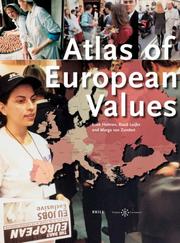| Listing 1 - 5 of 5 |
Sort by
|

ISBN: 1280461152 9786610461158 1402038461 1402038453 9048169801 Year: 2005 Volume: v. 17 Publisher: Dordrecht : [Great Britain] : Springer,
Abstract | Keywords | Export | Availability | Bookmark
 Loading...
Loading...Choose an application
- Reference Manager
- EndNote
- RefWorks (Direct export to RefWorks)
Recent Work on Intrinsic Value brings together for the first time many of the most important and influential writings on the topic of intrinsic value to have appeared in the last half-century. During this period, inquiry into the nature of intrinsic value has intensified to such an extent that at the moment it is one of the hottest topics in the field of theoretical ethics. The contributions to this volume have been selected in such a way that all of the fundamental questions concerning the nature of intrinsic value are treated in depth and from a variety of viewpoints. These questions include how to understand the concept of intrinsic value, what sorts of things can have intrinsic value, and how to compute intrinsic value. The editors have added an introduction that ties these questions together and places the contributions in context, and they have also provided an extensive bibliography. The result is a comprehensive, balanced, and detailed picture of current thinking about intrinsic value, one that provides an indispensable backdrop against which future writings on the topic may be assessed.
Values. --- Ethics. --- Deontology --- Ethics, Primitive --- Ethology --- Moral philosophy --- Morality --- Morals --- Philosophy, Moral --- Science, Moral --- Philosophy --- Values --- Axiology --- Worth --- Aesthetics --- Knowledge, Theory of --- Metaphysics --- Psychology --- Ethics --- Philosophy (General). --- Philosophy, general. --- Philosophy. --- Mental philosophy --- Humanities

ISBN: 9781139165433 9780521845656 9780521607841 0511109911 9780511109911 0511109601 9780511109607 9781107140967 110714096X 0521845653 0521607841 1107386071 1280422203 1139165437 0511171722 0511197519 051129882X Year: 2005 Publisher: Cambridge, UK ; New York : Cambridge University Press,
Abstract | Keywords | Export | Availability | Bookmark
 Loading...
Loading...Choose an application
- Reference Manager
- EndNote
- RefWorks (Direct export to RefWorks)
Suppose there is no God. This might imply that human life is meaningless, that there are no moral obligations and hence people can do whatever they want, and that the notions of virtue and vice and good and evil have no place. Erik J. Wielenberg believes this view to be mistaken and in this book he explains why. He argues that even if God does not exist, human life can have meaning, we do have moral obligations, and virtue is possible. Naturally, the author sees virtue in a Godless universe as different from virtue in a Christian universe, and he develops naturalistic accounts of humility, charity, and hope. The moral landscape in a Godless universe is different from the moral landscape in a Christian universe, but it does indeed exist. Value and Virtue in a Godless Universe is a tour of some of the central landmarks of this under-explored territory.
Atheism --- Religion and ethics --- Values --- Axiology --- Worth --- Aesthetics --- Knowledge, Theory of --- Metaphysics --- Psychology --- Ethics --- Ethics and religion --- Philosophy --- Agnosticism --- Free thought --- Irreligion --- Religion --- Secularism --- Theism --- Religion and ethics. --- Atheism. --- Values. --- Arts and Humanities

ISBN: 1282072471 9786612072475 0253111447 9780253111449 9780253346452 0253346452 0253346452 9781282072473 6612072474 Year: 2005 Publisher: Bloomington, Ind. Indiana University Press
Abstract | Keywords | Export | Availability | Bookmark
 Loading...
Loading...Choose an application
- Reference Manager
- EndNote
- RefWorks (Direct export to RefWorks)
In Appeal and Attitude, Steven G. Smith offers a multicultural view into issues at the heart of existentialism, hermeneutics, and the phenomenology of religion. By looking closely at the concepts of appeal, or what commands our attention, and attitude, or the quality of the attention we pay, Smith probes into the core of religious ideals to answer questions such as why faith and rationality are compelling and how religious experience becomes meaningful. Smith turns to philosophical and religious texts
Philosophical theology. --- Attitude (Psychology) --- Attention. --- Values. --- Theology, Philosophical --- Philosophy and religion --- Theology, Doctrinal --- Attitudes (Psychology) --- Psychology --- Public opinion --- Stereotypes (Social psychology) --- Concentration (Psychology) --- Flow (Psychology) --- Apperception --- Arousal (Physiology) --- Educational psychology --- Memory --- Thought and thinking --- Distraction (Psychology) --- Executive functions (Neuropsychology) --- Interest (Psychology) --- Axiology --- Worth --- Aesthetics --- Knowledge, Theory of --- Metaphysics --- Ethics

ISBN: 009189459X Year: 2005 Publisher: London Vermillon
Abstract | Keywords | Export | Availability | Bookmark
 Loading...
Loading...Choose an application
- Reference Manager
- EndNote
- RefWorks (Direct export to RefWorks)
Corporate culture. --- Decision making. --- Values. --- Moral and ethical aspects. --- Corporate culture --- Decision making --- Values --- #SBIB:17H25 --- #SBIB:17H3 --- #SBIB:35H411 --- Axiology --- Worth --- Aesthetics --- Knowledge, Theory of --- Metaphysics --- Psychology --- Ethics --- Deciding --- Decision (Psychology) --- Decision analysis --- Decision processes --- Making decisions --- Management --- Management decisions --- Choice (Psychology) --- Problem solving --- Culture, Corporate --- Institutional culture --- Organizational culture --- Corporations --- Organizational behavior --- Business anthropology --- Sociale wijsbegeerte: economische orde en arbeid --- Politieke wijsbegeerte --- Beleidscyclus: voorbereiding (inclusief planning) --- Sociological aspects

ISSN: 15685926 ISBN: 9004144609 9047415361 9789004144606 9789047415367 Year: 2005 Volume: 8 Publisher: Tilburg Tilburg University
Abstract | Keywords | Export | Availability | Bookmark
 Loading...
Loading...Choose an application
- Reference Manager
- EndNote
- RefWorks (Direct export to RefWorks)
"Who are the Europeans? How do they think? What values do they hold dear? What binds them and what divides them? This atlas summarizes the outcomes of the European Values Study, combined with results from the World Values Survey, two projects that have measured values over the past three decades." "The European Values Study project is run by researchers from 33 countries and is administered by Tilburg University, the Netherlands." "The Atlas presents European ideas and beliefs in the form of graphs, charts and maps. Values such as democracy, freedom, equality, human dignity and solidarity are held by almost all Europeans, but the survey points to differing views about marriage, religion, work and such topics as euthanasia, happiness, sexuality and death." "This unique Atlas covers all European nations from Iceland to Turkey, from Portugal to the Ukraine. It graphically illustrates the rich diversity that is Europe."--Jacket.
Social values --- Values --- Europeans --- Public opinion --- Group identity --- Attitudes --- Sociology of culture --- European Union --- Valeurs sociales --- Valeurs (Philosophie) --- Européens --- Opinion publique --- Atlases --- Atlas --- 303.37209409049 --- #SBIB:316.7C122 --- #SBIB:327.7H200 --- Ub11 --- 316:2 <4> --- 316.752 --- 651 Maatschappij. Algemeen --- 316:2 <4> Godsdienstsociologie--Europa --- Godsdienstsociologie--Europa --- 316.752 Waarden --(sociologie) --- Waarden --(sociologie) --- Axiology --- Worth --- Aesthetics --- Knowledge, Theory of --- Metaphysics --- Psychology --- Ethics --- Opinion, Public --- Perception, Public --- Popular opinion --- Public perception --- Public perceptions --- Judgment --- Social psychology --- Attitude (Psychology) --- Focus groups --- Reputation --- Collective identity --- Community identity --- Cultural identity --- Social identity --- Identity (Psychology) --- Collective memory --- Ethnology --- Cultuursociologie: overtuigingen, waarden en houdingen --- Europese Unie: algemeen --- Europa --- Statistieken --- Sociale aardrijkskunde --- Waarden --- Normen --- Atlas of European values --- Atlases. --- Statistische gegevens --- Waarde (ethiek) --- Norm (standaard) --- Crisis --- Cultuur --- Norm (gedragsregel) --- Social values - Europe - Public opinion - Atlases. --- Values - Europe - Public opinion - Atlases. --- Europeans - Attitudes - Atlases. --- Public opinion - Europe - Atlases. --- Group identity - Europe - Atlases. --- Maps
| Listing 1 - 5 of 5 |
Sort by
|

 Search
Search Feedback
Feedback About UniCat
About UniCat  Help
Help News
News